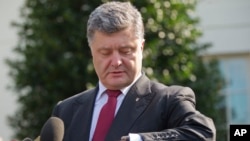Addressing a joint meeting of the U.S. Congress last week, Ukrainian President Petro Poroshenko asked for military aid and a special security status for his country. Poroshenko said his army needed more military equipment - both non-lethal and lethal. “Blankets and night vision goggles are important,” he said, “but one cannot win a war with blankets.”
After President Poroshenko’s speech to U.S. legislators, the White House said it remained committed to help Ukraine establish security and stability, respond to humanitarian and reconstruction needs, carry out constitutional reforms, restore its economy and fight corruption.
President Poroshenko returned to Ukraine with an aid package of $53 million, but without the lethal military equipment he requested. That aid was in addition to approximately $291 million in U.S. assistance and a $1 billion loan guarantee for Ukraine this year.
Analysts say Ukraine's president received less than he was hoping for from the United States.
Political Support
Steven Pifer, senior fellow at The Brookings Institution in Washington and a former U.S. ambassador to Ukraine, said Washington could have given Kyiv more military assistance.
“I personally think that the United States should have done more, but my guess is that was a secondary question to the overall message of political support for Ukraine," he said. "Certainly, the Unites States will do more, including the areas of military assistance, although at this point the U.S. government is providing non-lethal military assistance.But some elements, like counter-battery radar, can be very important for Ukraine.”
Eric Shiraev is professor of international relations and political psychology at George Mason University in Fairfax, Virginia, and author of several publications on U.S.-Russian relations. He said that the amount of aid Poroshenko received was insignificant.
“The visit was very rich on the form, but unfortunately for Ukraine, relatively low on the substance," he said. "And that is probably all the United States could give at this point - good numbers for those who needed a symbolic action, and dismal numbers for those who believed this would change the whole atmosphere and scope of American aid to Ukraine.”
Symbolism over substance
Shiraev believes Kyiv could receive more U.S. aid in the future, but that, for the moment, Ukraine is not American foreign policy's top priority.
“Today’s global context is not unfolding in favor of Ukraine, because there are other things that preoccupy the minds of politicians and the people in the West, particularly in the United States," he said. "Look at the headlines this week. They are all about the ISIS and the United States strikes against targets in Iraq and Syria. Ukraine for President Obama, yes, is important, but an inconvenient subject right now. Yes, it is a commitment, but yet a secondary one, because of the events in Syria and Iraq.”
A new bipartisan U.S. Senate bill would, if passed and signed into law, allocate $350 million to supply Ukraine with both non-lethal and lethal military equipment.
